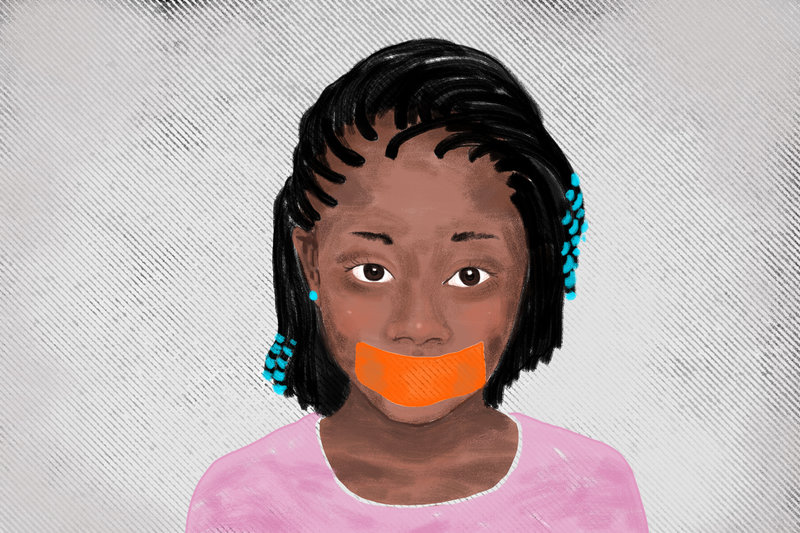The first two parts of the taboo-series explored the lack of puberty and sex education in early child development in Liberia. This last part focuses on the normalization of gender and sexual-based violence in Liberia.
Rape and sexual assault
Improper or, in most cases, nonexistent sex and relationship education leaves kids vulnerable to sexual exploitation and inappropriate sexual behavior. This is partly because they haven’t been taught what’s right or wrong and neither have they been given the confidence to describe unwanted behavior or even know where to go for help.
If you grew up in Liberia, you either participated in or heard of “Mama and Papa Play.“ Now, whoever created this game intended to fashion a game where kids could act out a drama where they take on roles to portray typical Liberian families, i.e. mother, father, and children. However, “Mama and Papa Play” is now a game that involves behavior that is sexually inappropriate for kids. Children engage in activities where they touch each other’s private parts which inevitably leads to them thinking that sexually inappropriate touches on their bodies are acceptable. Sometimes, older kids get involved in the game and end up taking sexual advantage of smaller kids.
What’s even more horrifying is that kids who have been touched inappropriately are sometimes afraid to tell their parents because they’re scared to get punished.
What does punishing a child for being violated achieve? Maybe it only sends a message that they’re to be blamed for ‘allowing’ someone to violate them. However, punishing the child does not save them from being violated; it just makes them, and their friends who saw them get punished, scared to ever come forth and report.
How is a child supposed to report rape or sexual assault when no one has sat him/her down and defined rape or sexual assault for them? And even if a kid is aware that this isn’t normal or right, how is he/she supposed to also figure that they’re not to blame for the abuse?
Let’s look at another scenario where a boy/girl is sexually assaulted and comes forth or the act is somehow brought to light. In the event that the perpetrator of this vile act is taken away and/or punished, nine times out of ten the kid is not talked to. The victim of this abuse isn’t sat down and talked with about what happened; nobody sees the very important need to tell this child that they’re not to blame for the abuse. Nobody lets them know that they did nothing to bring those hideous acts upon themselves.
Moreover, people need to understand that no matter how uncomfortable or painful it is for a parent to process the thought of their child being abused, an informative conversation with the kid is still necessary.
A lack of discussion of sexual assault could possibly lead to this kid growing into an adult with more psychological issues that would not exist if the discussion was had. Additionally, open discussions and counseling for rape and sexual assault victims are very crucial to the insanely tough journey of living a full life after being violated in this vile manner.
Unfortunately, the very definition of rape has not been made clear to most young people in Liberia and that’s where a huge part of the problem stems from. As a result, an effective way to tackle this issue would be creating seminars and outreach programs intended to educate young people on the description of rape and sexual assault. Also, integral to making sure rape cases do get legally reported, parents should be informed on appropriate measures to pursue. This would mean that parents deviate from using punishment as a deterrent to rape.
Domestic violence
Many Liberian kids grow up in households where they’re exposed to acts of domestic violence. Though it is illegal to domestically abuse anyone, legal measures are rarely sought by the victim. Children grow up vulnerable to hostile relationships which consequently drives them to believe that it is normal for a man to violently abuse his wife, and vice versa. The normalization of domestic violence in our culture leads children to think that violence is acceptable. A huge factor in why children grow up with a propensity to abuse their partners is because of the lack of awareness of domestic violence and its harms.
A woman/man abused by his/her spouse doesn’t sit down with kids who were unfortunate to witness this abuse to let them know that domestic abuse isn’t a normal thing. Subsequently, kids end up thinking that domestic violence is normal for relationships. Unsurprisingly, women are usually the victims of domestic violence which we believe factors in the birth of the “Togba love” phenomenon.
Some years back, “Togba love” was a phrase that swept the country. Togba love basically describes a relationship where the male is not just allowed, but expected to physically abuse the female. There were young and old women all around the country saying “if he doesn’t beat me, he doesn’t love me.” Studies have shown that children exposed to violence grow up to be adults who have sadistic or masochistic tendencies. Victims of dating violence are considerably more likely to engage in sexual activity and other risky behaviors (binge drinking, suicide attempts, physical fights) than non-victims.
These are all clear effects of being exposed and becoming desensitized to domestic violence.
Final Comments
The purpose of the “Taboo Series” is in no way, shape or form an attempt to take away from our Liberian traditions or to bring “Eurocentric” values into Liberia. However, let’s keep in mind that culture is not static, it evolves and changes over time.
Thus, this series is simply shedding light on the destructive effects of the existence of “taboo topics.” Liberia, as a country, has to reflect on the social norms associated with early childhood development and create a better approach in dealing with the issues mentioned and more. A simple reason why parents do not talk about these issues could be that they don’t know how to talk about them. Thus, the creation of programs to educate parents on the positive results of discussing these issues would be extremely beneficial. Avoiding the conversation does no help to us all because there’s no way to understand a situation if we cannot talk about it; it’s either we stay lost and stuck or we take gradual steps to address the elephant in the room.
There are many traumatic situations that could be avoided or made easier to overcome if parents brought their children up in a manner in which they’re taught about all life’s curveballs and milestones, regardless of how uncomfortable the discussion might be. We need to cultivate a safe space for our children where they understand that no topic is off limits and anything bothering them is up for discussion.


One Comment